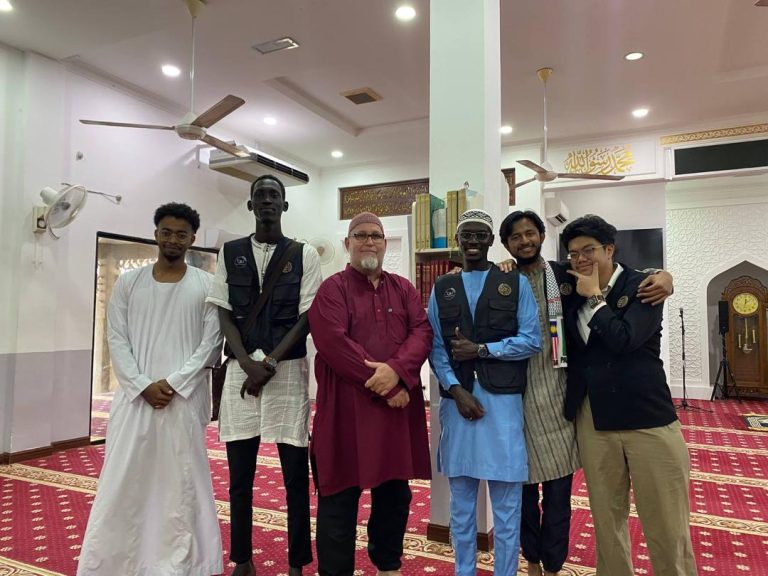By Daniel Fadzlan Bin Abdullah
Bachelor of Corporate Communication (Hons)
On the fresh morning of Saturday, 20 September 2025, a small but lively group of QIU students gathered at
Masjid Abdul Rahman Auf in Taman Rapat Koperasi for a programme titled “From Searching to Surrender: A Journey of Faith and Light,” led by Brother Taqi Abdullah. The session, organised by the QIU Muslim Society with support from student volunteers and local community partners, was designed as a reflective and conversational space, combining personal testimony and a practical workshop while being framed around questions, sincerity and mutual respect. The venue, a neighbourhood mosque a short drive from Ipoh, offered a calm setting for the program’s mix of prayer, personal story, group discussion and Q&A.
The presence of students from engineering, social sciences and other faculties helped make the conversation practical and wide-ranging. The main session ran from 9:00 a.m., where Brother Taqi shared his life story, a narrative that was candid and intentionally conversational. He spoke of reading scripture, consulting teachers and friends, and the practical steps he took, such as reading translations, collecting books and engaging in long personal conversations that sometimes lasted hours.
What made the session stand out was its emphasis on method as much as message. He explained how he asks simple, human questions first: what the visitor is interested in, whether it is architecture, culture, or spiritual questions. He described using concise, illustrated pamphlets that explain core ideas in accessible language and how those resources helped open conversations with people who had little previous contact with Muslims.
The talk was grounded in lived examples. Brother Taqi recounted street conversations and mosque tour work that sometimes stretched for hours. He stressed respect for personal space and the need to assess a person’s background and level of interest in religion before going deeper. He demonstrated, with humour and warmth, how reading body language, tailoring language and avoiding confrontational sources such as polarising online videos makes a real difference in sincere dialogue.
The programme made room for interaction. In the Q&A, students and community members asked practical questions about engaging respectfully with friends and family, dealing with misconceptions and balancing religious practice with study and work. Brother Taqi drew on both textual references and lived examples when answering. At one point, he encouraged asking for credible primary sources, such as direct passages from scripture and classic collections, rather than relying on short online clips. He also offered simple, tactical advice for students coping with stress: break long projects into manageable steps and keep one’s intention clear.
It is worth noting the broader civic context that makes events like this possible. QIU hosts a wide range of student activities and student societies that bring diverse perspectives into campus life. Outside the campus ecosystem, youth non-profits and volunteer groups work regionally on education and community projects. Organisations such as MyFundAction are examples of youth-led NGOs in Malaysia that encourage volunteerism, student leadership and cross-campus collaboration. These networks make it easier for students to organise events that are reflective, community-minded and deliberately open in tone.
At its best, the morning felt less like a sermon and more like a practised conversation, an exchange of stories, suggestions and mutual curiosity. Brother Taqi’s testimony was personal and detailed. Students left with concrete takeaways: how to ask respectful opening questions, where to point friends for accessible reading, and how to keep engagement practical and compassionate. The organisers closed with thanks to all attendees, volunteers and the mosque for hosting, and invited further dialogue in smaller groups and follow-up meet-ups.
Overall, “From Searching to Surrender” provided a template for low-key, student-friendly conversations about faith and identity, one where personal narrative, careful listening, and practical gestures of kindness were the means, not the end. The morning was a poignant reminder that honest stories and patient listening can create bridges across differences and destroy misconceptions about religion and contribute towards a more harmonious society, helping university communities learn from one another.




